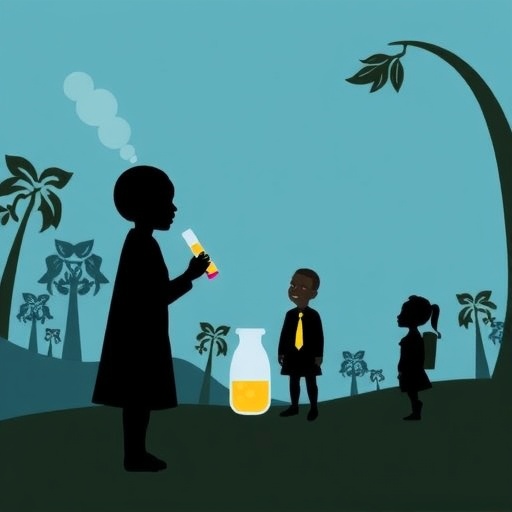In recent years, understanding the factors that shape students’ attitudes toward science education has garnered significant attention from educators and researchers alike. This discourse has gained even more prominence in regions where educational resources and exposure to science are critically limited. Central to this investigation is a noteworthy study conducted by Williams, Buabeng, and Amo-Darko, which offers profound insights into primary school students’ attitudes toward science in the left bank 2B district of Liberia.
The study systematically explores the determinants that affect how young learners perceive and interact with science. It delves into various aspects of educational experience, emphasizing the roles of students, teachers, and head teachers. The motivation behind this inquiry stems from the foundational belief that a positive attitude toward science not only enhances students’ academic performance but also nurtures their curiosity and engagement with the natural world.
At the heart of this investigation is the recognition that students’ attitudes are not formed in isolation. Instead, they are shaped by a myriad of factors, including sociocultural contexts, the quality of teaching methods employed, and the overarching school environment. Throughout the research, the authors employed qualitative and quantitative methodologies to dissect these complex interrelations, providing a holistic view of how educational dynamics operate within the Liberian context.
The authors’ keen focus on the local educational landscape underscores the unique challenges faced by teachers and administrators in Liberia. Historically, this region has grappled with inadequate infrastructure, limited resources, and interruptions from sociopolitical strife, which undoubtedly impact the teaching and learning processes. The study thus ensures to highlight how these challenges can influence students’ enthusiasm and perceptions of science as a subject.
Moreover, the intrinsic motivations of students also play a crucial role in shaping their attitudes. The research underscores the importance of fostering a conducive learning environment that encourages curiosity and experimentation. By allowing students to engage directly with scientific concepts through hands-on projects and interactive lessons, teachers can significantly enhance students’ appreciation for science.
Another intriguing element of the study is the perspective offered by head teachers, who often serve as pivotal figures in educational reform. Their insights reveal how leadership styles and administrative support influence both teacher performance and student outcomes. This highlights the necessity for strategic leadership that prioritizes the development of science curricula and the provision of adequate resources.
The findings of this research are not merely of academic interest; they possess practical implications. By understanding the determinants of attitudes toward science, educational policymakers can develop targeted initiatives designed to improve science education at the primary level. This could involve training programs for teachers that emphasize innovative and engaging teaching strategies, as well as community outreach initiatives to promote the importance of science education among families.
Importantly, this study contributes to a growing body of literature which advocates for an interdisciplinary approach to science education. By integrating elements of local culture, real-world science applications, and collaborative learning experiences, educators can make science more relatable and inspiring for students. This could ultimately lead to increased enrollment in science courses and careers in STEM fields, fostering a generation of scientifically literate individuals equipped to tackle future challenges.
The authors also point out the role of societal attitudes toward education, particularly in how families and communities perceive the value of science. In this regard, awareness campaigns could play a key role, helping to reshape community values around education and its importance in future economic development. Engaging parents and local leaders in discussions about the benefits of an intensive focus on science can create a supportive network for students’ educational journeys.
As the global community pushes toward achieving the Sustainable Development Goals (SDGs), the insights gleaned from this study are vital. They contribute to the dialogue about ensuring inclusive and equitable quality education for all. The researchers advocate for continued support and investment in educational infrastructure, emphasizing that no child should be left behind when it comes to accessing quality science education.
In conclusion, the findings presented by Williams, Buabeng, and Amo-Darko offer a detailed examination of the factors that influence primary students’ attitudes toward science in Liberia. Their work not only emphasizes the critical role of teachers but also highlights the need for systemic change within educational frameworks. By fostering positive attitudes toward science, we can nurture a future generation equipped with the skills to explore, innovate, and address pressing global challenges.
This research also serves as a clarion call for other similar studies to be conducted in diverse contexts, paving the way for a comprehensive understanding of how different sociocultural factors shape educational attitudes around the globe. The journey towards enhancing science education, particularly in underprivileged areas, presents an opportunity for shared learning and collaboration among educators, policymakers, and communities.
Ultimately, as the discourse around STEM education continues to evolve, reflections from such studies will ensure that strategies are informed by the real experiences and needs of educators and students in various contexts. Therefore, let us embrace this learning journey together to cultivate scientific curiosity and passion, transforming the future of education.
Subject of Research: Determinants of primary school students’ attitudes toward science education in Liberia.
Article Title: Exploring the determinants of primary school students’ attitudes toward science: insights from students, teachers and head teachers in the left bank 2B district of Liberia.
Article References:
Williams, B.K., Buabeng, I. & Amo-Darko, B. Exploring the determinants of primary school students’ attitudes toward science: insights from students, teachers and head teachers in the left bank 2B district of Liberia.
Discov Educ 4, 393 (2025). https://doi.org/10.1007/s44217-025-00750-w
Image Credits: AI Generated
DOI: 10.1007/s44217-025-00750-w
Keywords: science education, primary education, student attitudes, Liberia, educational reform, STEM fields.




